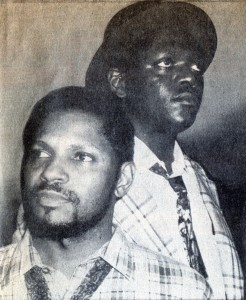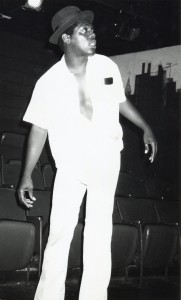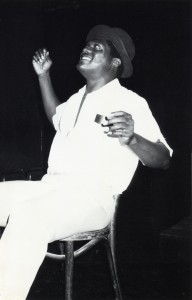Parkway Playhouse
September 6 – October 15, 1985
By Athol Fugard, John Kani and Winston Ntshona
Directed by Chuck Smith
“Johnny Lee Davenport is Sizwe, with a wider-eyed country innocence that, like the play, will entertain you and haunt you.”
—Dick Saunders, Chicago Sun-Times (September 9, 1985)
“[This is] a powerful piece of theater, and a great opportunity for two actors to show their talents. . . . The present revival . . . is a compelling production. . . . As Sizwe Bansi, Johnny Lee Davenport is a smiling, simple soul, roused to rage at last when he realizes how little his life means to him under oppression.”—Richard Christiansen, Chicago Tribune (September 11, 1985)
“Act II is the essence or soul of Sizwe Bansi Is Dead. Johnny Lee Davenport is Sizwe Baznsi and Buntu is Tony Stokes. It tests what a South African worker might be compelled to do in order to survive. Messers. Stokes and Davenport are very, very convincing. Their characters are so powerfully portrayed that it is impossible not to feel the inner-pain ‘voluntarily’ inflicted for the sake of survival.”
—W. Derek Hayes, The Chicago Observer (September 14, 1985)
“Tony Stokes and Johnny Lee Davenport, two of Chicago’s most outstanding actors, brought to Athol Fugard’s drama Sizwe Bansi Is Dead a gripping sense of reality that was in every detail compelling at the Parkway Community House, 500 E. 67th St. . . . Stokes and Davenport bring to their roles an assertive recreation of their characters rather than a dramatic interpretation. . . . Through Sizwe Bansi Is Dead, these discerning actors provided a rewarding exploration into the cruel bondage of South Africans existing in their own homeland in a superbly evocative manner and with an unquestioned conviction sincere involvement.”
—Earl Calloway, Chicago Defender (September 14, 1985)
“The current production . . . stars Johnny Lee Davenport in the title role and Tony Stokes in the roles of Styles and Buntu . . . .The remaining stanza focuses on the relationship of Davenport and Stokes in the attempt to inform the unknowing Bansi about the facts of life in the land of apartheid. The dialogue calls for the actor to convey the anger felt by all men shackled firmly within a racist bureaucracy.”
—Bob Gura, Citizen Newspaper (September 19, 1985)



